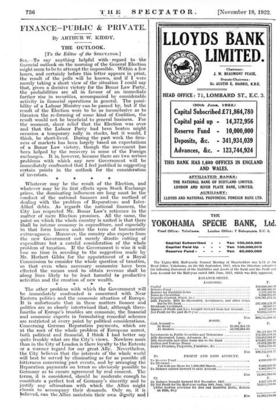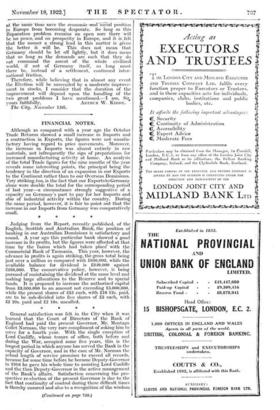FINANCE—PITS -IC & PRIVATE.
[To. the Editor of . the SPECTATOR.] Sis,—To say anything helpful with - regard to ...the financial outlook on the morning of the General Election might seem to be to attempt the impossible. Within a few hours, and certainly before this letter appears in print, the result of the polls will be known, and if I were merely taking a short view of the situation I could say that, given a decisive victory for the Bonar Law Party, the probabilities are all in favour of an immediate further rise in securities, accompanied by considerable activity in financial operations in general. The possi- bility of a Labour Ministry can be passed by, but if the result of the Election were to be so inconclusive as to threaten the re-forming of some kind of Coalition, the result would not be beneficial to general business. For the moment, sheer relief that the Election was over and that the Labour Party had been beaten might occasion a temporary rally in stocks, but it would, I think, be short-lived. During the past week the firm- ness of markets has been largely based on expectations of a Bonar Law victory, though the movement has been helped by the recovery in some of the Foreign exchanges. It is, however, because there are two serious problems with which any new Government will be immediately confronted that I feel justified in suggesting certain points in the outlook for the consideration of investors.
Whatever may be the result of the Election, and whatever may be its first effects upon Stock Exchange prices, the dominating influences ere long must be the conduct of the national finances and the method of dealing with the problem of Reparations and Inter- Allied debts. As regards the national finances, the City has respected Mr. Bonar Law's reticence in the matter of mere Election promises. All the same, the point on which the whole country is united is that there Shall be intense economy in expenditure, and especially in that form known under the term of bureaucratic extravagance. Moreover, the country also expects from the new Government not merely drastic cutting of expenditure but a careful consideration of the whole problem of taxation. If the Government is wise it will lose no time in acceding to the suggestion made by Mr. Herbert Gibbs for the appointment of a Royal Commission to consider the whole question of taxation, so that even when necessary economies have been effected the means used to obtain revenue shall be along lines likely to be least harmful to productive activities and the creation of new wealth.
The other problem with which the Government will be immediately confronted is concerned with Near Eastern politics and the economic situation of Europe. It is unfortunate that in these matters finance and politics arc so closely intertwined that, although three- fourths of Europe's troubles are economic, the financial and economic experts in formulating remedial schemes are restricted at every point by political considerations. Concerning German Reparation payments, which are at the root of the whole problem of European unrest, both political and financial, I think I had better say quite frankly what are the City's views. Nowhere more than in the City of London is there loyalty to the Entente or a warmer regard for our great Ally. Nevertheless, the City believes that the interests of the whole world will best be served by eliminating as far as possible all bitterness concerning past events, and by arranging the Reparation payments on terms so obviously possible to Germany as to ensure agreement by real consent. The terms, it is considered, should be moderate enough to constitute a perfect test of Germany's sincerity and to justify any ultimatum with which the Allies might choose to accompany their demands. Only so, it is believed, can the Allies Maintain their own dignity and at the 'saiiie—timesaie the economic -a-nd—sOCial position in Europe, from becoming desperate. So long as this Reparation problem remains an open sore there ' will be no peace;and no prosperity in Europe, and it is felt that the sooner a strong lead in this matter is given the better it will be. This does not mean that Geimany should be let off lightly, knit .it does mean that so long as the deinands are such that they do not command the assent of the whole civilized world, if not of Germany itself, so long. must there be, instead of a settlement, continued inter- national friction.
Therefore, while believing that in almost any event the Election will be succeeded by a moderate improve- ment in stocks, I consider that the duration of the improvement will depend upon the handling of the two great problems I have mentioned.—I . am, Sir, yours faithfully, ARTHUR W. KIDDY. The City, November 15th.







































 Previous page
Previous page